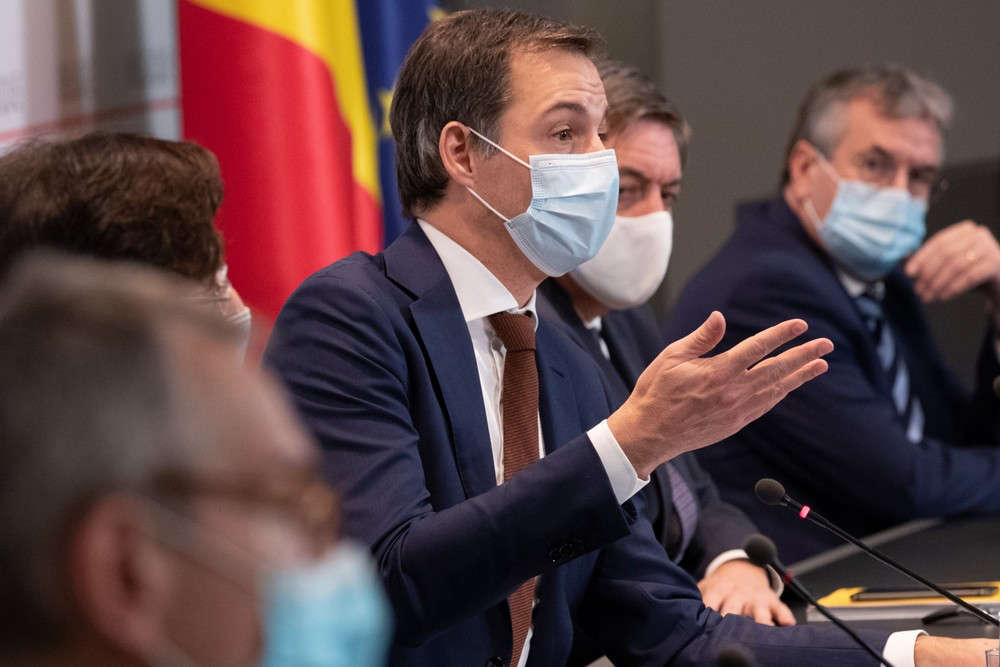Belgium will lift all measures previously imposed on businesses in the catering industry, except the wearing of face masks, Prime Minister Alexander De Croo announced during a press conference on Friday.
"In our country, we are seeing the same theme that we see in most European countries, a rather slow but sure increase in the number of coronavirus cases," De Croo said.
"We are expecting this trend to continue for a while because of travel and the fact that schools will soon reopen and people will return to work," he added.
However, he said that there is also good news, as the increase in infections isn't translating into an increase in the number of hospitalisations and deaths, and that this is "mainly the result of the vaccinations, which have changed the rules of the game."
"That is why it is good news that we are a leading country when it comes to vaccination. There are few countries that are better than us," De Croo said.
He emphasised that this is also why getting vaccinated is the key message, as this is "a concrete thing you can do to help the situation in Belgium" and to help reopen society.
De Croo added that the next phase of the summer plan, planned for 1 September, will go ahead, as more than eight out of ten people have been vaccinated.
1 September
As of Wednesday, 1 September, all restrictions on businesses in the catering industry, with the exception of wearing face masks, will be lifted.
This means there will no longer be a set closing time for bars and restaurants, that people can once again stand at the bar and there is no longer a limit on the number of people at the table. However, you will still have to wear a face mask when not seated.
As previously announced by Brussels Minister-President Rudi Vervoort, these measures will not be lifted in Brussels.
Meanwhile, dancing at weddings will once again be allowed from 1 September. Dancing in bars will remain prohibited until 1 October.
The restriction on the number of people that can gather in a private home - currently, you can invite a maximum of eight people - will cease to apply.
Meanwhile, the strong recommendation for companies to encourage their employees to work from home will be lifted. However, companies are asked to give telework a place.
There will be no more restrictions on events with 200 visitors inside or 400 outside regarding wearing face masks or people having to keep their distance.
From October onwards, this rule will be extended to events attended by 500 people inside and 750 outside. At larger events, the Covid Safe Ticket will be used to continue without restrictions.
From 1 October, after one and a half years of being closed, nightclubs will once again be allowed to reopen.
Meanwhile, wearing face masks will remain compulsory on public transport, in shops, shopping centres, places of worship, libraries and in crowded places such as a fair.
Mandatory vaccination
The vaccination coverage rate target has been adapted slightly. The new aim is for a vaccination rate of 70% among the entire population in every municipality, rather than 70% across the whole of Belgium.
De Croo emphasised that not only in Brussels but also in other places where the rate is lower, more will have to be done to increase this rate.
In the regions where, in certain municipalities, the vaccination coverage rate is lower, the Covid Safe Ticket - with which people can give proof of vaccination, recovery from the virus, or a recent negative PCR test result - can be implemented in other places, including for bars and restaurants.
Vaccination will also become mandatory for healthcare workers, and the Consultative Committee has asked the various Ministers of Health to give more information about how this can be arranged.
"For people in the healthcare sector, getting vaccinated is more than just a choice, as they have a responsibility to protect the people they are taking care of," said De Croo.
Meanwhile, the testing system for people who have not been vaccinated and are returning from a red zone within the EU will be changed.
Those who cannot produce a vaccination certificate, up to now, had to be tested on day 1 or 2 and had to stay in quarantine until receiving a negative test.
Now, a compulsory test will also have to be taken on day seven, however, quarantine between the two tests is not necessary. If they test positive, they will have to self-isolate.
The Committee has also asked for the end of a federal phase for the management of the coronavirus crisis, which has been in place since 12 March 2020, to be prepared.
"This does not mean that there is no more need for a collaboration between the regions," De Croo added.
Flemish Minister-President Jan Jambon added that the planning of the end of this phase will be discussed during the next Consultative Committee, expected to take place in mid-September.

